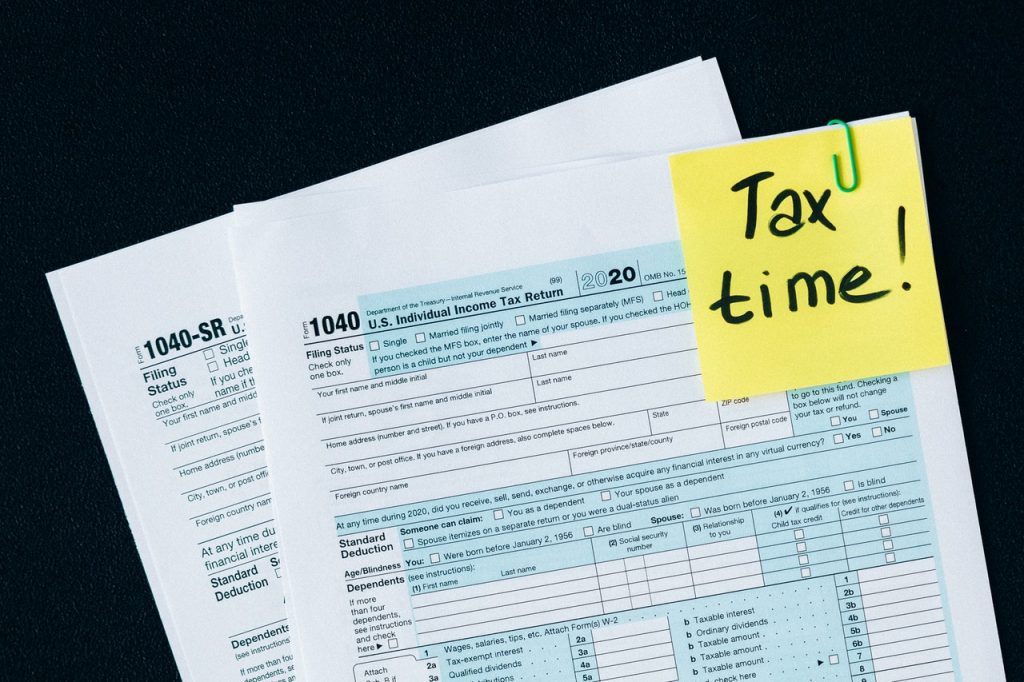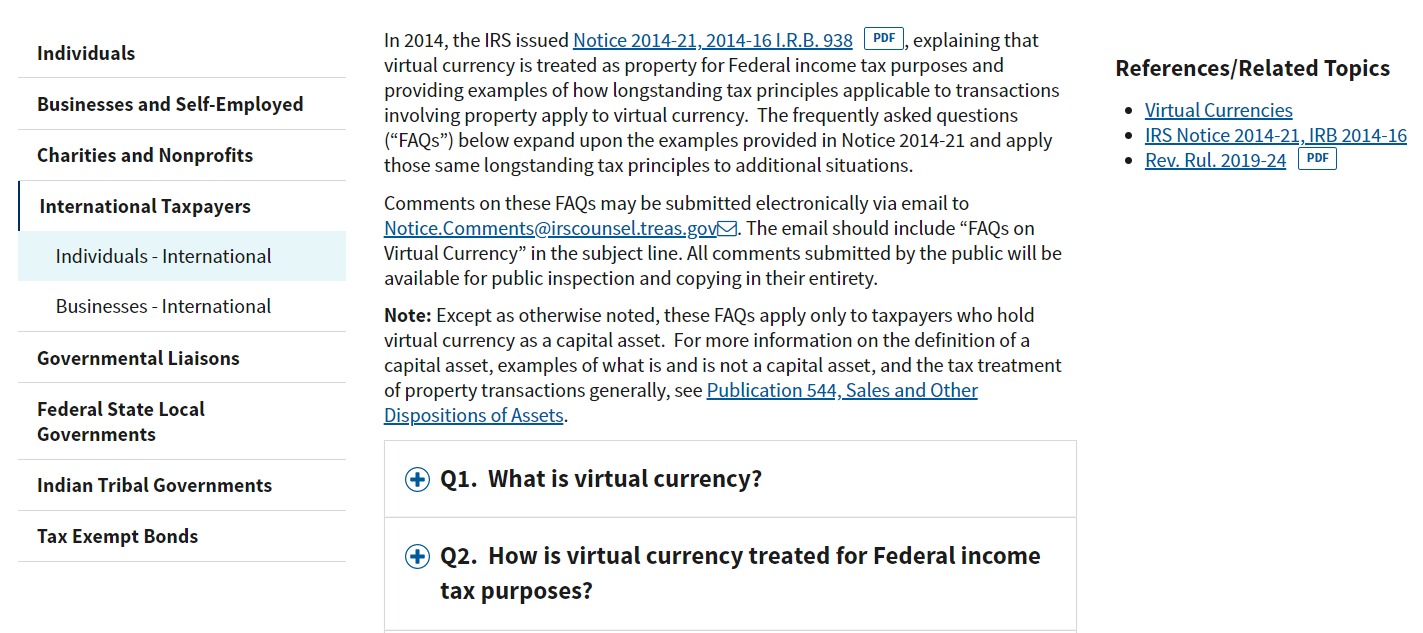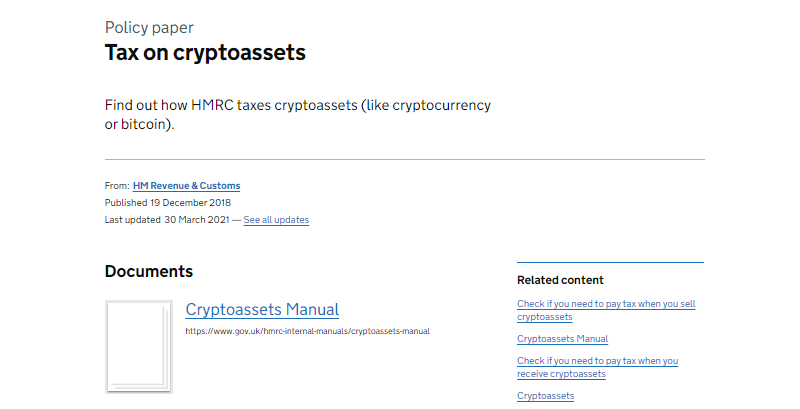In the absence of any formal guidelines issued by the tax authorities, it’s natural to get puzzled about the taxability of NFTs. Even though there are no official rules related to NFT taxes, your income from these digital collectibles could be subjected to taxes.
If you’re an artist who creates and sells his best NFTs or an investor who buys or invests in NFTs for profit, understanding NFT taxes is critical to dealing with the tax bill at the end of every year.
Read ahead as we analyze how NFT taxes work, how taxable events are defined in NFT transactions, what’s the status of NFT taxation in the USA and the UK, and a lot more.
Your capital is at risk
NFT Taxes – Quick Overview
Taxable events in NFT transactions include – selling an NFT in exchange for cryptocurrency, buying an NFT with a fungible cryptocurrency, or exchanging an NFT for another NFT.
These taxable incidents are decided upon the nature of the transaction, i.e., whether it is carried by an NFT creator or an NFT investor.
- Taxable events for NFT creators: Selling an NFT in exchange for cryptocurrency
- Taxable events for NFT investors: Buying an NFT with a fungible cryptocurrency, changing one NFT for another, selling an NFT in exchange for cryptocurrency
Though there are no official guidelines by the tax authorities of many countries, NFTs, in most scenarios, would be subjected to the capital gains tax.
How do NFT Taxes Work?
A non-fungible token (NFT) is a data unit that is digitally stored. NFTs cannot be used interchangeably because they are unique items. This is why they are known as ‘Non-fungible’ tokens.
The great majority of NFTs are subjected to some form of taxation. Whenever an artist sells any NFT, the income earned from it must be reported on their tax returns. If they are an investor, then the sales or trades would be taxed as property.
According to their income, they may be required to pay taxes ranging from 0% to 20% on their transactions. In the same way, if you are an NFT creator, you may also be required to pay taxes on your income generated from NFT transactions.
Depending upon the tax slabs, your profits would be categorized as income and taxed as per the ordinary income tax rates, ranging from 10% to 37%. The income earned by content creators could also be subjected to self-employment tax rates as per the rules and regulations of the country.
Also, the tax system for NFTs will consider the duration for which the concerned person has held the asset. Taxable events may include selling an NFT for cryptocurrency, buying them with fiat or crypto, or trading them for other NFTs.
Still, it’s worth noting that the IRS has yet to take a clear stance on the tax status of NFTs. It is plausible that NFTs will be taxed in the same way as cryptocurrency, which is taxed as property with a long-term capital gains tax rate ranging from 0% to 20%, depending on your income.
What Are Taxable Events in NFT Markets?
“Any event or transaction that results in a tax consequence for the party which implements the transaction is referred to as a taxable event”.
It is any action or transaction that results in tax due to the government.
In terms of NFT transactions, taxable events generally include selling an NFT in exchange for cryptocurrency, buying an NFT with a fungible cryptocurrency, or exchanging an NFT for another NFT.
Let us analyze how tax laws or different regulations related to NFT taxes treat such incidents:
Selling an NFT in exchange for cryptocurrency
If you have made an NFT, you would not be required to pay any tax as the creation of NFT is not a taxable event in the eyes of the law. But, if you sell any NFT on the marketplaces such as OpenSea or Rarible, this would be considered a taxable event, and you would be required to pay tax on this transaction.
When you sell an NFT, you must pay taxes on the proceeds. As per US tax laws, profits on your NFT sale are treated under the category of income and are subjected to the ordinary income tax rate, ranging from 10% – 37%.
This is a similar tax treatment to being paid in cryptocurrency, as well as mining or staking cryptocurrency.
Buying an NFT with a fungible cryptocurrency
When you buy an NFT with a cryptocurrency, you are disposing of the cryptocurrency and will incur a capital gain or loss. For example, if you purchased an NFT trading card on Rarible with appreciated Ethereum, you would have a capital gain and would be required to pay taxes on this capital gain.
If, on the other hand, you purchased the NFT trading card with depreciated Ethereum, you would suffer a capital loss that you may use to mitigate other capital gains, lowering your tax liability.
Exchanging an NFT for another NFT
A taxable event occurs when one NFT is exchanged for another NFT. For example, if you purchased an NFT for $3,000 in ETH and traded it for another NFT worth $5,500 in ETH a few months later, you would have a $2,500 taxable capital gain.
What creators need to know about NFT Taxes
The taxes for those who set up NFTs are relatively simple. Still, even if the tax implications of digital art are ignored, it is not unusual to receive an unexpected tax bill when filing tax returns.
Let’s take a glance at the most critical tax implications for creators:
Creation of NFTs
If you have created an NFT, you are not made to pay any tax because creating an NFT is not a taxable event in the legal sense. But if you sell an NFT on marketplaces such as OpenSea or Rarible, this is regarded as a taxable event, and you must pay tax on the transaction.
Selling NFTs in exchange for crypto
Though you are not required to pay any tax when you have made an NFT, you are supposed to pay tax if you sell that NFT. When you sell an NFT, the proceeds must be taxed. According to US tax laws, the profits from your NFT sale are classified as income and are subject to the ordinary income tax rate, which ranges from 10% to 37%.
This is similar to being paid in cryptocurrency, as well as mining or staking cryptocurrency, in terms of taxation. The income generated from selling NFTs is also subject to self-employment taxes at 15.3 percent.
Self-employment taxes are a combination of Social Security and Medicare taxes primarily levied on individuals who work for themselves.
What investors need to know about NFT Taxes
Compared with the situation for creators, there are a few extra importantly taxable instances to consider for NFT traders and investors. Capital gains tax will be levied on the following NFT activities:
Buying an NFT with a fungible cryptocurrency
When you use a cryptocurrency to purchase an NFT, you are disposing of the cryptocurrency and incur a capital gain or loss. For example, if you used appreciated Ethereum to purchase an NFT trading card on Rarible, you would have a capital gain and must pay taxes on this capital gain.
While if you bought the NFT trading card with depreciated Ethereum, you would incur a capital loss, which you could use to offset other capital gains, lowering your tax liability.
Changing one NFT for another
When one NFT is exchanged for another, a taxable event occurs. For example, if you paid $4,000 in ETH for an NFT and later traded it for another NFT worth $5,500 in ETH, you would have a $1,500 taxable capital gain.
Selling an NFT in exchange for cryptocurrency
When you sell an NFT, you either make or lose money. For example, if you purchased an NFT for $5000 ETH on a cost-basis and sold it for $10,000 ETH, you would have a $5,000 taxable capital gain.
What are NFT Taxes in the US?
IRS FAQ section on Crypto
The IRS is yet to issue NFT-specific tax guidance. It’s important to note that it has been unable to take a definitive position on the tax status of NFTs. NFTs, on the other hand, are most likely classified as “collectibles” under Section 408(m) of the Internal Revenue Code.
Even though not strictly defined, “any work of art” is considered a collectible under Section 408(m)(2)(A). The taxation of NFTs is determined by how they are interacted with. You can get involved with NFTs in two ways: you can make and sell NFTs in a marketplace, or you can purchase and sell them as an investor.
Ordinary income taxes and self-employment taxes apply to NFT creators. Profits from your NFT sale are classified as income under US tax laws and are subject to the ordinary income tax rate, ranging from 10% to 37%.
In tax terms, this is comparable to being paid in cryptocurrency, mining or staking cryptocurrency. The proceeds from the sale of NFTs are also subject to self-employment taxes at a rate of 15.3 percent.
Creators disclose NFT-related income on Schedule C (Profit or Loss From Business) or on the applicable business tax return (Form 1120, 1120S, or Form 1065). Creators can subtract any ordinary and necessary business expenses from the income recognized under Section 162. Auction fees, transaction fees, subscription fees, and any other expenses incurred in connection with NFT sales income are examples of common expenses.
Taxes on NFT investments are similar to those on cryptocurrency trading. NFTs are frequently purchased with cryptocurrencies such as ether. Buying an NFT with Ethereum results in a taxable event because you are disposing of a cryptocurrency, which is classified as property under IRS Notice 2014-21.
Assume you bought an NFT worth $2,000 (1 ETH) in January 2021. You used 1 ETH purchased several years ago for $200 to make a purchase. You would make a long-term capital gain of $1,800 ($2,000 – $200) if you bought the NFT in January. Because the ETH has been held for more than a year, this is regarded as long-term.
Long-term capital gains are taxed at zero percent, fifteen percent, or twenty percent. The NFT purchased would have a cost basis of $2,000. If you sold this NFT for an amount of $10,000 in March 2021, you would make a short-term capital gain of about $8,000. Here, this gain is only short-term as you have held this NFT for less than a year before selling. Short-term gains are taxed at the same rates as ordinary income.
Form 8949 (Sales and Other Dispositions of Capital Assets) and Schedule D (Capital Gains and Losses) can be used by investors to disclose the disposition of cryptocurrency to buy NFTs and the resale of NFTs.
As previously explained, NFTs are usually considered as “collectibles” under the tax rules; as a result, high-income earners (unmarried persons with over $441,450 in taxable income and married persons with over $496,000 in taxable income) face a 28 percent tax rate on collectible gains, compared to the highest 20 percent tax rate on regular cryptocurrency and stock long-term capital gains.
What are NFT Taxes in the UK?
Her Majesty’s Revenue and Customs (HMRC) is the department in charge of tax collection in the UK. Although no public HMRC guidelines on the UK tax status of NFTs are available, it’s a safe bet to assume they’d be categorized as a taxable asset for capital gains and inheritance tax purposes, along with being taxable in other ways.
This means that the sale or disposition of an NFT will almost always result in a capital gain or loss for tax purposes. Capital Gains Tax is levied on capital gains (CGT). If you are generating your own NFTs, you must consider whether the NFT should be given capital treatment or is a trading activity that is taxed and accounted for separately.
You may realize capital gains under the following circumstances: when you sell an NFT, exchange an NFT for another type of virtual tokens, such as another NFT or cryptocurrency, and give an NFT to someone else (excluding a spouse or civil partner). At the same time, the gain on the sale of an NFT is usually the NFT’s value at disposal in £GBP less the cost of purchase, transaction fees, and advertising for a buyer or seller.
NFT Tax info on HMRC website
A complicated question arises regarding the location of a token for tax purposes, which is essential for United Kingdom residents with a foreign residence who claim the remittance basis of taxation. According to HMRC, bitcoin and other fungible tokens will be placed where the beneficial owner of the token resides.
It appears safe to suppose that the same principle could apply to NFTs representing digital assets, though it remains to be seen how much this rule will apply to a token representing a tangible asset class whose location can be identified (unlike a bitcoin or a meme).
According to UK tax law, an NFT is an asset, so if you sell it for more than you charged for it, you will owe tax – most likely Capital Gains Tax, unless it is sold in the course of your business. In terms of capital profits, there are two types of gains in this category: short-term capital gains and long-term capital gain.
Profits earned from selling your NFTs held for less than a year are classified as short-term capital gains, while profits earned from selling your NFTs held for more than a year are classified as long-term capital gains. Because short-term capital gains are taxed at a higher rate than long-term capital gains, it is best to hold your NFTs for a longer period of time to avoid paying higher taxes.
Though the status of taxation on NFTs is yet to be made clear by the HMRC still, the UK’s tax department has been conducting raids and searches to ensure no fraud is taking place in this virtual space. Recently, the authority, a £1.4 million (roughly $1.9 million) fraud case, seized £5,000 in crypto assets (approximately $6,762), as well as three NFT artworks that have yet to be valued.
Nick Sharp, deputy director of economic crime in HMRC, has stated that this seizure should serve “as a warning to anyone who thinks they can use crypto assets to hide money from HMRC.” HMRC hopes this seizure would reduce the instances of tax cheats and frauds in the digital space.
Your capital is at risk
Are There Any International Regulations Regarding NFTs?
Non-fungible tokens (NFTs) have been a talking point around the world in recent years. Though there do not exist any international regulations regarding the NFTs, still many countries are coming up with their rules and regulations governing the taxation issues related to these digital collectibles.
In many countries, non-fungible tokens are taxed in the same way that cryptocurrencies are. Many countries’ tax regulations, including that of Australia, the UK, and the USA, determine the tax treatment of the NFTs by how it is used, as well as why it is held and transacted with. Contrary to these regulations, some countries are yet to recognize NFTs as a valid asset in the eyes of their law. For example, the NFT has not yet been regulated under Indonesian law, depending on the present regulatory regime of crypto assets.
As far as the taxation regime of India is concerned, income from the transfer of any virtual assets would be subjected to the tax rate of 30%. Also, there would be a 1% tax deduction at source on payments incurred during the purchase of any virtual assets, including NFTs. In the same way, NFTs are also subjected to taxation in the Philippines as the Philippines Bureau of Internal Revenue (BIR) states that every income is subjected to taxation, regardless of its source.
As per BIR, the taxability of an NFT transaction would be highly dependent on the activity performed. It may be counted as income for players and subject to the graduated income tax table. As a result, if the player’s annual income is not more than PHP 250,000, no tax is due. Investors dealing with players, on the other hand, might be considered to be conducting or pursuing commercial activity on a regular basis. They may be subject to VAT, other percentage taxes (if applicable), income tax, and other taxes and fees (e.g., registration fees).
How are NFT Taxes Different from Cryptocurrencies?
In many countries, NFTs are taxed in the same way that cryptocurrencies are. For example, although there are not any formal guidelines on the status of NFT taxation, just like cryptocurrencies, these digital collectibles are also subjected to capital gains tax. NFTs are taxable assets, just like cryptocurrencies. The way you interact with NFTs determines how taxes are applied to them.
You can get involved with NFTs in one of two ways: as a creator and seller on a marketplace or as an investor who buys and sells them. This distinction between the taxable incidents in the case of NFT creators and investors is not generally seen in the case of cryptocurrencies.
In the same way, in the USA, NFTs may be taxed In the same way as cryptocurrencies, which are taxed as property and treated with a long-term capital gains tax rate varying from 0% to 20% based on your income.
The almost same scenario is applicable in India, where NFTs and crypto coins are dealt as virtual assets under the taxation rules, and the income derived from their transfer would be subjected to the tax rate of 30%. Also, any payments made during the purchase of any virtual assets, including NFTs and crypto-assets, would be subject to a 1% tax deduction at the source. As a result, it can be concluded that NFTs and cryptocurrencies are treated in a similar manner when it comes to the taxation regime of many countries.
Conclusion
Tax authorities in some countries have yet to really take an official position on the NFT taxes, Metamask taxes, Ethereum taxes, or NFT tax evasion. The more transactions you conduct, the more difficult recording and calculating NFT taxes also become. To be on the safe side, NFTs can generally be assumed to be taxed in the same way as crypto assets, which is taxed as property with capital gains tax.
The tax incidents remain different for creators and investors in the case of NFTs. Having said that, any NFTs sold after a holding period of less than one year will be treated with short-term capital gains tax rates (equivalent to ordinary income tax rates), regardless of whether they are considered property or collectibles. As a result, it’s critical to understand the tax implications of NFTs, whether you’re creating them or investing in them.
You can also read our article on the ecological impact of NFTs to understand the effect of NFTs on the environment.




